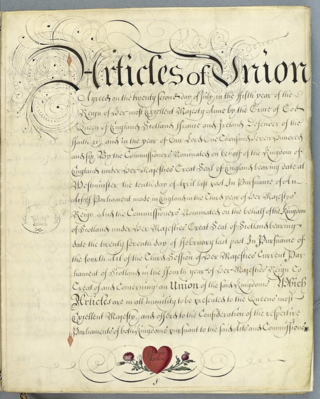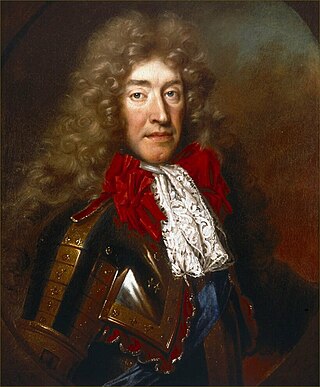
The Acts of Union were two Acts of Parliament: the Union with Scotland Act 1706 passed by the Parliament of England, and the Union with England Act 1707 passed by the Parliament of Scotland. They put into effect the terms of the Treaty of Union that had been agreed on 22 July 1706, following negotiation between commissioners representing the parliaments of the two countries. By the two Acts, the Kingdom of England and the Kingdom of Scotland—which at the time were separate states with separate legislatures, but with the same monarch—were, in the words of the Treaty, "United into One Kingdom by the Name of Great Britain".

The United Kingdom has four legal systems, each of which derives from a particular geographical area for a variety of historical reasons: English and Welsh law, Scots law, Northern Ireland law, and, since 2007, purely Welsh law as a result of Welsh devolution, with further calls for a Welsh justice system.

The Kingdom of Great Britain, officially Great Britain, was a sovereign country in Western Europe from 1 May 1707 to the end of 31 December 1800. The state was created by the 1706 Treaty of Union and ratified by the Acts of Union 1707, which united the kingdoms of England and Scotland to form a single kingdom encompassing the whole island of Great Britain and its outlying islands, with the exception of the Isle of Man and the Channel Islands. The unitary state was governed by a single parliament at the Palace of Westminster, but distinct legal systems—English law and Scots law—remained in use.

Duke of Rothesay is a dynastic title of the heir apparent to the British throne, currently William, Prince of Wales. William's wife Catherine, Princess of Wales, is the current Duchess of Rothesay. Duke of Rothesay was a title of the heir apparent to the throne of the Kingdom of Scotland before 1707, of the Kingdom of Great Britain from 1707 to 1800, and now of the United Kingdom of Great Britain and Northern Ireland. It is the title mandated for use by the heir apparent when in Scotland, in preference to the titles Duke of Cornwall and Prince of Wales, which are used in the rest of the United Kingdom and overseas. The Duke of Rothesay also holds other Scottish titles, including those of Earl of Carrick, Baron of Renfrew, Lord of the Isles, and Prince and Great Steward of Scotland. The title is named after Rothesay on the Isle of Bute, but is not associated with any legal entity or landed property, unlike the Duchy of Cornwall.

The House of Stuart, originally spelled Stewart, was a royal house of Scotland, England, Ireland and later Great Britain. The family name comes from the office of High Steward of Scotland, which had been held by the family progenitor Walter fitz Alan. The name Stewart and variations had become established as a family name by the time of his grandson Walter Stewart. The first monarch of the Stewart line was Robert II, whose male-line descendants were kings and queens in Scotland from 1371, and of England, Ireland and Great Britain from 1603, until 1714. Mary, Queen of Scots, was brought up in France where she adopted the French spelling of the name Stuart.

The Act of Security 1704 was a response by the Parliament of Scotland to the Parliament of England's Act of Settlement 1701. Queen Anne's last surviving child, William, Duke of Gloucester, had died in 1700, and both parliaments needed to find a Protestant successor. The English Parliament had settled on Electress Sophia of Hanover, granddaughter of King James VI and I, without consulting the Scottish Parliament.

The Parliament of Great Britain was formed in May 1707 following the ratification of the Acts of Union by both the Parliament of England and the Parliament of Scotland. The Acts ratified the treaty of Union which created a new unified Kingdom of Great Britain and created the parliament of Great Britain located in the former home of the English parliament in the Palace of Westminster, near the City of London. This lasted nearly a century, until the Acts of Union 1800 merged the separate British and Irish Parliaments into a single Parliament of the United Kingdom with effect from 1 January 1801.

The Kingdom of England existed on the island of Great Britain from 12 July 927, when it unified from various Anglo-Saxon kingdoms, until 1 May 1707, when it united with Scotland to form the Kingdom of Great Britain.

Andrew Fletcher of Saltoun was a Scottish writer and politician, remembered as an advocate for the non-incorporation of Scotland, and an opponent of the 1707 Act of Union between Scotland and England. Fletcher became an exile in 1683 after being accused of promoting insurrection. He was appointed the cavalry commander of the Monmouth Rebellion, but shortly after landing in England, he killed another leading figure. He again went into exile, this time as a fugitive and with his estates forfeit. He returned with William of Orange, becoming Commissioner of the old Parliament of Scotland.

The Union of the Crowns was the accession of James VI of Scotland to the throne of the Kingdom of England as James I and the practical unification of some functions of the two separate realms under a single individual on 24 March 1603. Whilst a misnomer, therefore, what is popularly known as "The Union of the Crowns" followed the death of James's cousin, Elizabeth I of England, the last monarch of the Tudor dynasty.

Scottish nationalism promotes the idea that the Scottish people form a cohesive nation and national identity.
The Alien Act was a law passed by the Parliament of England in February 1705, as a response to the Parliament of Scotland's Act of Security of 1704, which in turn was partially a response to the English Act of Settlement 1701. Lord Godolphin, the Lord High Treasurer, was instrumental in the Union of 1707 and all the Acts leading up to it. The Alien Act was passed to prevent the inconveniences that would occur hastily if these two Kingdoms were not to become one Union.

The Parliament of Scotland was the legislature of the Kingdom of Scotland from the 13th century until 1707. The parliament evolved during the early 13th century from the king's council of bishops and earls, with the first identifiable parliament being held in 1235 during the reign of Alexander II, when it already possessed a political and judicial role.

The Treaty of Union is the name usually now given to the treaty which led to the creation of the new state of Great Britain, providing that the Kingdom of England and the Kingdom of Scotland were to be "United into One Kingdom by the Name of Great Britain". At the time it was more often referred to as the Articles of Union.
Events from the year 1703 in the Kingdom of Scotland.

The formation of the United Kingdom of Great Britain and Northern Ireland has involved personal and political union across Great Britain and the wider British Isles. The United Kingdom is the most recent of a number of sovereign states that have been established in Great Britain at different periods in history, in different combinations and under a variety of polities. Historian Norman Davies has counted sixteen different states over the past 2,000 years.

Scots law is the legal system of Scotland. It is a hybrid or mixed legal system containing civil law and common law elements, that traces its roots to a number of different historical sources. Together with English law and Northern Ireland law, it is one of the three legal systems of the United Kingdom.

The Glorious Revolution in Scotland refers to the Scottish element of the 1688 Glorious Revolution, in which James VII was replaced by his daughter Mary II and her husband William II as joint monarchs of Scotland and England. Prior to 1707, the two kingdoms shared a common monarch but were separate legal entities, so decisions in one did not bind the other. In both countries, the Revolution confirmed the primacy of Parliament over the Crown, while the Church of Scotland was re-established as a Presbyterian rather than Episcopalian polity.















